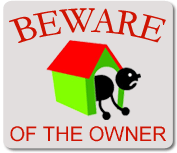New Law Tackles Irresponsible Dog Ownership
 As of 20th October 2014, the police and local authorities in England and Wales were given new legal powers to tackle irresponsible dog ownership. They will be able to demand that dog owners take action to prevent anti-social behaviour.
As of 20th October 2014, the police and local authorities in England and Wales were given new legal powers to tackle irresponsible dog ownership. They will be able to demand that dog owners take action to prevent anti-social behaviour.
Animal Welfare Minister Lord de Mauley said:
"Dog attacks are devastating for victims and their families which is why we are taking tough action against those who allow them to happen. Police and local authorities will now have more powers to demand that irresponsible dog owners take steps to prevent attacks before they occur. This is on top of the tougher prison sentences we introduced earlier this year for owners who allow their dogs to attack people and assistance dogs."
If a complaint has been made about a dog to the council or police, the dog's owners could be ordered to do any or all of the following:
- Attend dog training classes
- Muzzle the dog or require it to be on a lead in public
- Require the dog to be microchipped and/or neutered
- Repair fencing to prevent the dog leaving the property
A new 'Dealing with irresponsible dog ownership: practitioner’s manual' guides police forces and local authorities in the use of their new legal powers.
The manual discusses the use of informal, non-statutory methods to deal with dog related complaints before resorting to the anti-social behaviour powers. Early preventative measures such as Community Protection Notices can be used to help prevent more serious events occurring in the future.
Acceptable Behaviour Contracts
ABCs can be used to address potential issues early and reduce the need for more formal measures. An ABC allows authorities to engage with an individual about their inappropriate behaviour by speaking to them and offering appropriate advice.
Community Protection Notice
CPNs provide a statutory tool that can be used in cases of irresponsible dog ownership. A CPN can be used in cases where an Acceptable Behaviour Contract has not worked or in instances where the threshold is met and a statutory notice is more appropriate. They can be used in low-level incidents involving dogs e.g. where the owner is failing to control the dog and the dog is causing nuisance to others/other animals.
Injunctions
A civil order to prevent anti-social behaviour and address its causes. Used for higher level incidents e.g. intimidation, attacks or incidents involving other animals. The Injunction enables officers to deal with behaviour that is of a higher level, where the CPN may not be the appropriate tool to use and more formal action may be required.
Criminal Behaviour Order
An order obtained for convicted offenders to prevent and stop anti-social behaviour and address the causes. The CBO allows authorities to deal with the most serious and persistent offenders where their behaviour has brought them before a criminal court.
Public Spaces Protection Orders
The primary purpose of the PSPO is to empower local authorities to deal with anti-social behaviour that adversely affects other people using the same public space. The PSPO replaces Dog Control Orders, under which a local authority could, for example, exclude dogs from designated areas and require dogs to be kept on leads. The PSPO will continue to allow these kinds of restrictions to be put in place, but will also allow the local authority to be more flexible when responding to local problems involving dogs.
Sources
Dangerous dogs: tough new law
Irresponsible dog ownership (pdf)
Further reading - Amended Dangerous Dogs Act - What you need to know
